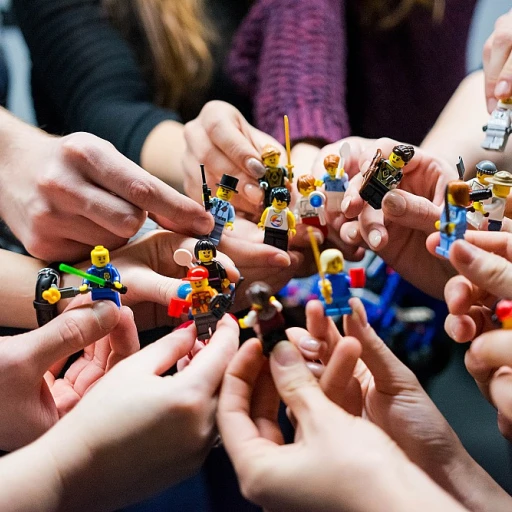Understanding the Importance of Classroom Management
Recognizing the Impact of Classroom Management
Classroom management is an essential aspect of the education system that directly affects both teaching and learning outcomes. In the currently evolving educational environment, understanding the impact of effective classroom management is crucial for educators who wish to enhance their skills and ensure an optimal learning environment for their students.
Effective management strategies within a classroom not only create a structured learning environment but also foster positive behavior among students. This is particularly important in both early childhood and special education settings, where social emotional skills are as significant as academic knowledge. By establishing behavioral expectations and implementing consistent support strategies, teachers can promote an environment conducive to learning while addressing challenging behaviors effectively.
Teachers and educators must be adept at implementing courses and training in classroom management to maximize student engagement. Continuous professional development and teacher training play a crucial role in this regard. Schools can support educators by providing head start programs, staff training workshops, and opportunities for group instruction that focus on refining skills pertinent to behavior management.
The influence of well-executed classroom management extends beyond immediate educational outcomes. It is about creating a nurturing setting where both teachers and students thrive. For educators eager to refine their strategies, understanding the intricate balance of expectations, rules, and social skills is key to cultivating a positive classroom atmosphere. By mastering the art of managing an educational environment, educators can embark on a journey that improves learning experiences and outcomes, as explored in this
mastering educational projects resource.
Key Strategies for Effective Classroom Management
Adopting Practical Approaches in the Classroom
Creating an effective classroom environment hinges on the adoption of practical strategies that cater to both students' and teachers' needs. In the quest for successful classroom management, it is essential to integrate adaptive strategies that contribute to a structured and conducive learning environment. Here, we explore some key approaches that educators can incorporate to enhance their management skills and stimulate a positive learning atmosphere.
- Establish Clear Expectations: It's vital for educators to set clear and concise expectations from the outset of the course. Defining acceptable behavior and reinforcing it regularly helps students understand the boundaries within which they can operate. A consistent approach to rules and expectations lays a foundation for a well-managed classroom.
- Incorporate Social Emotional Learning (SEL): SEL is instrumental in promoting social skills and emotional intelligence among students. By weaving these principles into the curriculum, teachers can foster a classroom environment that values empathy and understanding, ultimately leading to reduced behavioral issues and more positive interactions among students.
- Implement Positive Behavior Support Strategies: Encouraging positive behavior through rewards and recognition can significantly improve student engagement and cooperation. By acknowledging students' good behavior, educators reinforce desirable actions, making it a norm within the classroom setting. This approach not only improves behavior management but also enhances the learning environment.
- Emphasize Professional Development: Teachers should continually seek opportunities for skills enhancement. Whether it’s through formal teacher training sessions, workshops, or peer collaboration, investing in professional development improves educators’ ability to manage classrooms effectively. Enhancing skills with continuous learning contributes to professional growth and the ability to handle challenging behaviors efficiently.
- Utilize Technological Tools: Leveraging technology in education provides innovative ways to monitor and improve classroom management. From online platforms for behavior tracking to interactive tools that engage students, technology offers numerous possibilities for educators aiming to enhance their management strategies.
Adopting these strategies can empower educators to create a harmonious learning environment that prioritizes both the educational development and behavioral management of students. As school systems become increasingly dynamic, the onus is on teachers to adapt and evolve with the changing landscape to effectively lead and inspire their classrooms.
Utilizing Resources for Growth
In the ever-evolving world of education, teachers have a plethora of tools and resources at their disposal to enhance their performance in the classroom. Professional development plays a critical role in equipping educators with the necessary skills and strategies to manage classroom environments effectively. Continuous learning and adaptation are essential to address the diverse needs of students and keep up with the latest educational trends.
There are numerous avenues through which teachers can pursue professional development to refine their classroom management skills. For instance:
- Workshops and Seminars: Attending workshops focused on behavior management and positive behavior support can provide educators with hands-on experience and strategies that are directly applicable in real-life settings. Engaging in such collaborative learning experiences allows teachers to exchange ideas and learn from fellow educators;
- Online Courses and Webinars: The digital era offers numerous online platforms and webinars aimed at providing in-depth training for educators seeking to enhance their classroom management strategies. These platforms often offer flexible learning schedules, making it easier for teachers to integrate learning into their busy routines;
- Special Education and Early Childhood Programs: Special training programs, such as those focusing on early childhood and special education, equip teachers with specific tactics to accommodate unique learning needs. Recognizing the importance of differentiated instruction ensures that educators can manage a diverse classroom effectively.
Furthermore, educators can greatly benefit from connecting with coaches and trainers who guide them in the application of their newly acquired skills. The
role of trainers and coaches in continuous learning highlights the importance of practical support in professional development, akin to the support strategies that teachers learn to implement in their classrooms.
Creating a robust support network and access to developmental resources not only empowers teachers but also contributes positively to the entire school environment, fostering an atmosphere conducive to learning and growth.
Challenges in Implementing Classroom Management Techniques
Overcoming Hurdles in the Classroom
Managing a classroom effectively requires not only strategies and tools but also the ability to tackle various challenges that arise. Educators across diverse educational settings—from early childhood to special education—constantly encounter a range of obstacles while striving to maintain an optimal classroom environment. Understanding these challenges and developing appropriate responses are essential for teachers aiming to foster a learning environment that supports positive behavior and academic achievement.
One of the primary challenges educators face comes from managing challenging behaviors. Students may exhibit a variety of behaviors that disrupt the learning environment, which can be influenced by factors like social-emotional development, external pressures, or a lack of proper classroom management strategies in place. Teachers must be equipped with behavior management skills and support strategies that help them address such issues effectively.
Beyond behavioral challenges, educators also have to contend with the difficulty of implementing new classroom management strategies consistently across the board. Differing individual needs of students necessitate a personalized approach, which can be taxing on teachers who are already stretched thin with lesson planning and administrative tasks.
Additionally, teachers might face resistance when incorporating certain management strategies, particularly when introducing new group instruction techniques or transitioning to a more inclusive classroom environment. It’s vital for educators to communicate with students and provide a supportive classroom environment where positive behavior is encouraged.
Teacher training and professional development courses are invaluable resources for addressing these challenges. Programs focusing on teacher training, such as those offered by head start and education specialists, provide opportunities for development in areas like social skills enhancement and effective classroom management. Investing in continuous learning through workshops, behavior management courses, and collaborative training empowers teachers to tackle these hurdles head-on and create classrooms that are conducive to both teaching and learning.
Ultimately, understanding and addressing challenges in implementing classroom management techniques is crucial for educators looking to refine their skills. By equipping themselves with the right tools and embracing professional development, teachers can transform challenges into opportunities for growth and educational success.
The Role of Continuous Learning in Classroom Management
Embracing Continuous Learning for Classroom Success
The dynamic nature of the education field necessitates that teachers continually refine their skills to address the ever-evolving needs of students. Continuous learning in the context of classroom management is essential for developing effective strategies and fostering an environment where both students and educators can thrive.
Continuous learning enables teachers to gain innovative insights into behavior management and the development of positive social skills among students. By engaging in professional development opportunities such as courses, workshops, and training sessions, educators can expand their repertoire of management strategies tailored to diverse classroom environments. Special education, early childhood education, and social-emotional learning are key areas where teachers can deepen their understanding and enhance their effectiveness.
Moreover, staying updated with the latest techniques and tools ensures that teachers are better equipped to handle challenging behaviors and create a positive classroom environment. Educators who embrace a mindset of continuous learning will find themselves adept at adapting to new teaching methods, managing group instruction, and implementing support strategies effectively.
Professional development plays a crucial role in supporting this learning journey. Schools and districts should encourage and facilitate opportunities for staff training, highlighting the importance of teacher training and skill enhancement. Initiatives like "Head Start" provide valuable resources and frameworks for developing educators' competencies in classroom management.
Incorporating continuous learning into daily practice not only benefits teachers but also contributes to building a supportive community of educators. Sharing experiences and insights gained from professional development can lead to stronger collaboration among teachers, ultimately enriching the educational experience for students.
Continuous learning is not a one-time event but a sustained commitment to excellence. As educators strive to perfect their classroom management skills through ongoing development and training, they will be better positioned to nurture a thriving, supportive, and positive learning environment for all students.
Fostering Collaboration and Mutual Support
Creating a supportive community for educators is a crucial aspect of effective classroom management. Fostering collaboration and mutual support among teachers enhances the teaching environment, ultimately benefiting both educators and students.
Firstly, communication is key. Teachers should have open channels to share ideas, experiences, and strategies related to classroom management. This not only promotes the exchange of knowledge but also helps educators stay informed about new techniques in education, behavior management, and professional development.
Moreover, collaborative workshops provide a platform where teachers can learn from their peers. Workshops that focus on early childhood, special education, and social emotional learning equip educators with skills to manage challenging behaviors and create a positive behavior culture. Staff training sessions are also valuable, where education teachers, special education specialists, and other school professionals unite to devise strategies for a more effective classroom management approach.
In addition, mentorship programs within schools can be beneficial. Seasoned educators guide less experienced teachers, offering insights into successful classroom management strategies and sharing tips for creating an inclusive learning environment. This mentorship fosters a culture of continuous learning, where teachers are encouraged to develop both professionally and personally.
Support groups within the school community can also play a pivotal role in helping educators cope with the challenges of classroom management. Whether it's through informal meet-ups or structured support sessions, these groups allow teachers to discuss and address the difficulties they face, which can include managing student behavior, finding new instructional strategies, or understanding diverse learning needs.
Ultimately, by creating a supportive community, schools not only enhance the skills of their teachers but also lay the foundation for a thriving educational environment. The emphasis on collaboration and support helps educators navigate the complex dynamics of the classroom, making professional development a shared journey rather than an individual challenge. This collective effort contributes to a better educational experience for both students and teachers, cultivating a culture of positive growth and learning.














